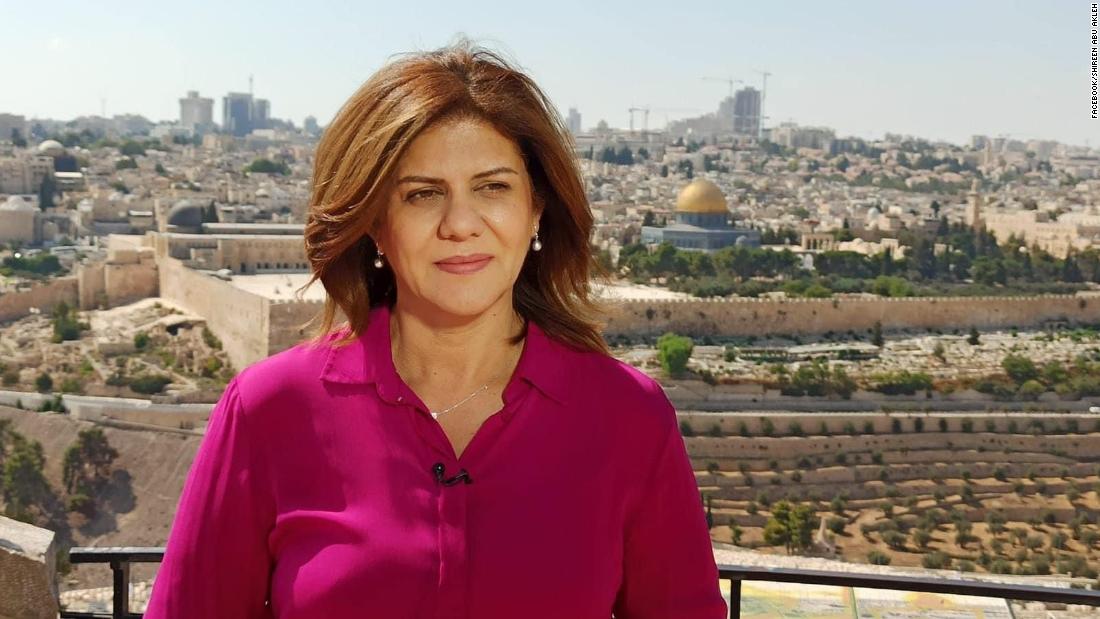‘They were shooting directly at the journalists’: New evidence suggests Shireen Abu Akleh was shot dead in targeted attack by Israeli forces
(Several shots ring out in quick succession, cutting through a clear, blue spring morning in Jenin, in the West Bank. Crack, crack, crack, crack, crack, crack, crack. The cameraman filming the scene scrambles backwards to take cover behind a low concrete wall. Then a man cries out in Arabic: “Injured! Shireen, Shireen, oh man, Shireen! Ambulance!”
When the camera operator pans around the corner, Al Jazeera journalist Shireen Abu Akleh can be seen lying motionless, face down on the ground as another Palestinian reporter, Shatha Hanaysha, crouches down beside her, using a tree trunk for cover. Hanaysha reaches out and tries to rouse her as gunshots continue. There’s no response. Both women are wearing helmets and blue protective vests marked “Press.”
In the moments that follow, a man in a white T-shirt makes several attempts to move Abu Akleh, but is forced back repeatedly by gunfire. Finally, after a few long minutes, he manages to drag her body from the street.
The shaky video, filmed by Al Jazeera cameraman Majdi Banura, captures the scene when Abu Akleh, a 51-year-old Palestinian-American was killed by a bullet to the head at around 6:30 a.m. on May 11. She had been standing with a group of journalists near the entrance of Jenin refugee camp, where they had come to cover an Israeli raid. While the footage does not show Abu Akleh being shot, eyewitnesses told CNN that they believe Israeli forces on the same street fired deliberately on the reporters in a targeted attack. All of the journalists were wearing protective blue vests that identified them as members of the news media.
“We stood in front of the Israeli military vehicles for about five to ten minutes before we made moves to ensure they saw us. And this is a habit of ours as journalists, we move as a group and we stand in front of them so they know we are journalists, and then we start moving,” Hanaysha told CNN, describing their cautious approach toward the Israeli army convoy, before the gunfire began.
When Abu Akleh was shot, Hanaysha said she was in shock. She couldn’t understand what was happening. After Abu Akleh dropped to the ground, Hanaysha thought she might have stumbled. But when she looked down at the reporter she had idolized since childhood, it was clear she wasn’t breathing. Blood was pooling under her head.
“As soon as she [Shireen] fell, I honestly wasn’t comprehending that she [was shot] … I was hearing the sound of bullets, but I wasn’t comprehending that they were coming at us. Honestly, the whole time I wasn’t understanding,” she said.
“I thought they were shooting so we stayed back, I didn’t think they were trying to kill us.”
On the day of the shooting, Israeli military spokesperson Ran Kochav told Army Radio that Abu Akleh had been “filming and working for a media outlet amidst armed Palestinians. They’re armed with cameras, if you’ll permit me to say so,” according to The Times of Israel.
The Israeli military says it is not clear who fired the fatal shot. In a preliminary inquiry, the army said there was a possibility Abu Akleh was hit either by indiscriminate Palestinian gunfire, or by an Israeli sniper positioned about 200 meters (about 656 feet) away in an exchange of fire with Palestinian gunmen — though neither Israel nor anyone else has provided evidence showing armed Palestinians within a clear line of fire from Abu Akleh.
The Israel Defense Forces (IDF) said on May 19 that it had not yet decided whether to pursue a criminal investigation into Abu Akleh’s death. On Monday, the Israeli military’s top lawyer, Major General Yifat Tomer-Yerushalmi, said in a speech that under the military’s policy, a criminal investigation is not automatically launched if a person is killed in the “midst of an active combat zone,” unless there is credible and immediate suspicion of a criminal offense. United States lawmakers, the United Nations and the international community have all called for an independent probe.
But an investigation by CNN offers new evidence — including two videos of the scene of the shooting — that there was no active combat, nor any Palestinian militants, near Abu Akleh in the moments leading up to her death. Videos obtained by CNN, corroborated by testimony from eight eyewitnesses, an audio forensic analyst and an explosive weapons expert, suggest that Abu Akleh was shot dead in a targeted attack by Israeli forces.
CNN


Leave a Reply
You must be logged in to post a comment.